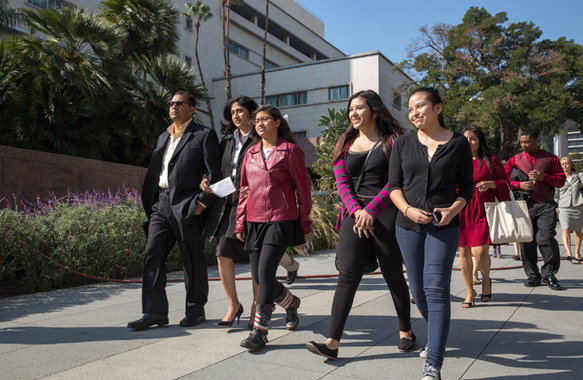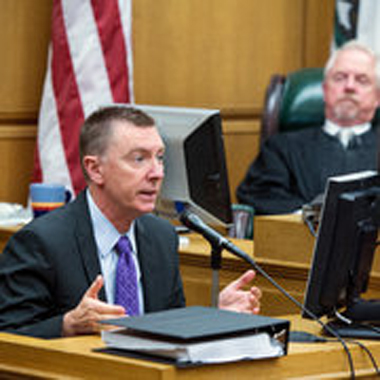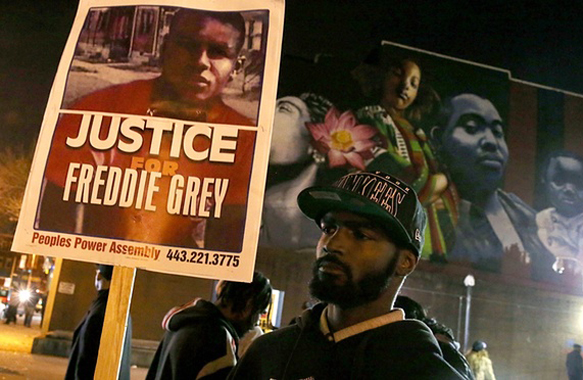Some of the students who are suing the State of California over tenure for teachers walked to a news conference this week outside Superior Court in Los Angeles. Monica Almeida/The New York Times
By Jennifer Medina | Originally Published at The New York Times. January 31, 2014
LOS ANGELES — They have tried and failed to loosen tenure rules for teachers in contract talks and state legislatures. So now, a group of rising stars in the movement to overhaul education employment has gone to court.
In a small, wood-paneled courtroom here this week, nine public school students are challenging California’s ironclad tenure system, arguing that their right to a good education is violated by job protections that make it too difficult to fire bad instructors. But behind the students stand a Silicon Valley technology magnate who is financing the case and an all-star cast of lawyers that includes Theodore B. Olson, the former solicitor general of the United States, who recently won the Supreme Court case that effectively overturned the state’s ban on same-sex marriage.
“Children have the right to access good education and an effective teacher regardless of their circumstances,” said David F. Welch, the telecommunications entrepreneur who spent millions of his own dollars to create Students Matter, the organization behind the lawsuit. The group describes itself as a national nonprofit dedicated to sponsoring litigation of this type, and the outcome in California will provide the first indication of whether it can succeed.
Teachers’ unions, which hold powerful sway among lawmakers here, contend that the protections are necessary to ensure that teachers are not fired unfairly. Without these safeguards, the unions say, the profession will not attract new teachers.
“Tenure is an amenity, just like salary and vacation, that allows districts to recruit and retain teachers despite harder working conditions, pay that hasn’t kept pace and larger class sizes,” James M. Finberg, a lawyer for the California teachers’ unions, said this week in his opening statement in court.
The monthlong trial promises to be a closely watched national test case on employment laws for teachers, one of the most contentious debates in education. Many school superintendents and advocates across the country call such laws detrimental and anachronistic, and have pressed for the past decade for changes, with mixed success. Tenure for teachers has been eliminated in three states and in Washington, D.C., and a handful of states prohibit seniority as a factor in teacher layoffs. But in many large states with urban school districts, including California and New York, efforts to push through such changes in the legislature have repeatedly failed.
While several lawsuits demanding more money for schools have succeeded across the country, the California case is the most sweeping legal challenge claiming that students are hurt by employment laws for teachers. The case also relies on a civil rights argument that so far is untested: that poor and minority students are denied equal access to education because they are more likely to have “grossly ineffective” teachers.
Judge Rolf Michael Treu, of Los Angeles County Superior Court, will decide the nonjury trial. His ruling will almost certainly be appealed to the State Supreme Court.
Witnesses are expected to explain many of their basic assumptions about how to create quality schools.
The first witness for the plaintiffs was John E. Deasy, the superintendent of Los Angeles Unified School District and a staunch opponent of tenure rules and “last in, first out” seniority for teachers. Mr. Deasy testified that attempts to dismiss ineffective teachers can cost $250,000 to $450,000 and include years of appeals and legal proceedings. Often, he said, the district is forced to decide that the time and money would be too much to spend on a case with an unclear outcome, in part because a separate governing board can reinstate the teachers. Such rules make it impossible not to place ineffective teachers at schools with high poverty rates, he told the court.
Teachers’ unions contend that such job protections help schools keep the best teachers and recruit new ones to a job that is often exhausting, challenging and low paid. Mr. Finberg, the lawyer for the unions, said in court that the fact that Mr. Deasy has increased the number of ineffective teachers dismissed from the classroom — to about 100 of the district’s 30,000 teachers — suggests that the laws are working.
The plaintiffs’ legal team, from the firm of Gibson, Dunn & Crutcher, includes not only Mr. Olson, who served as solicitor general under President George W. Bush, but also Theodore J. Boutrous Jr., a lawyer for Apple in its antitrust case on e-book pricing. The lawyers and public relations firm behind Students Matter previously teamed to overturn the California ballot measure against same-sex marriage and say this case could have a similar ripple effect across the country. Among the boldface names siding publicly with the plaintiffs is Antonio R. Villaraigosa, the former mayor of Los Angeles, who joined them in a news conference outside the courthouse this week.
“The case has the potential to have really broad and important implications not just for California,” said Michelle A. Rhee, the former Washington schools chancellor who now runs Students First, an advocacy group that works to elect leaders who support changing the employment laws for teachers. “In an ideal world you would want policies to be passed in the legislature, but in California there was no movement on that. I think in this case they were tired of waiting.”
Teachers’ unions nationwide have fought changes in employment laws, contending that their members must be protected from capricious or vengeful administrators. In Colorado, where a sweeping law in 2010 created a new system to evaluate teachers, the unions are suing over a provision that lets principals decide whether to hire veteran teachers who lost jobs because of budget cuts or drops in enrollment.
Randi Weingarten, the president of the American Federation of Teachers, said in a telephone interview that the California case echoes the fights she had when she led the teachers’ union in New York, and called the lawsuit “worse than troubling.”
“It’s yet another example of not rolling up your sleeves and dealing with a problem, but instead finding a scapegoat,” Ms. Weingarten said. “They are not suing about segregation or funding or property tax systems — all the things you really need to get kids a level playing field. They want to strip teachers of any rights to a voice.”
State education laws across the country are changing. School districts in 29 states use poor effectiveness as grounds for dismissal, according to a report released Thursday by the National Council on Teacher Quality, a Washington-based think tank that tracks teacher policies. Just five years ago, no states allowed student performance to be considered in teachers’ evaluations, said Kate Walsh, the executive director of the center. Now, 20 states require such data.
“We have really seen mountains move in some places — the trend in the country has been toward meaningful ways to evaluate teachers and to use that evaluation to make tenure decisions,” Ms. Walsh said in an interview. “But I don’t think anyone has figured out how to implement them particularly well yet.”
Ian Lovett contributed reporting.
A version of this article appears in print on February 1, 2014, on page A12 of the New York edition with the headline: Fight Over Effective Teachers Shifts to Courtroom.














Leave A Comment